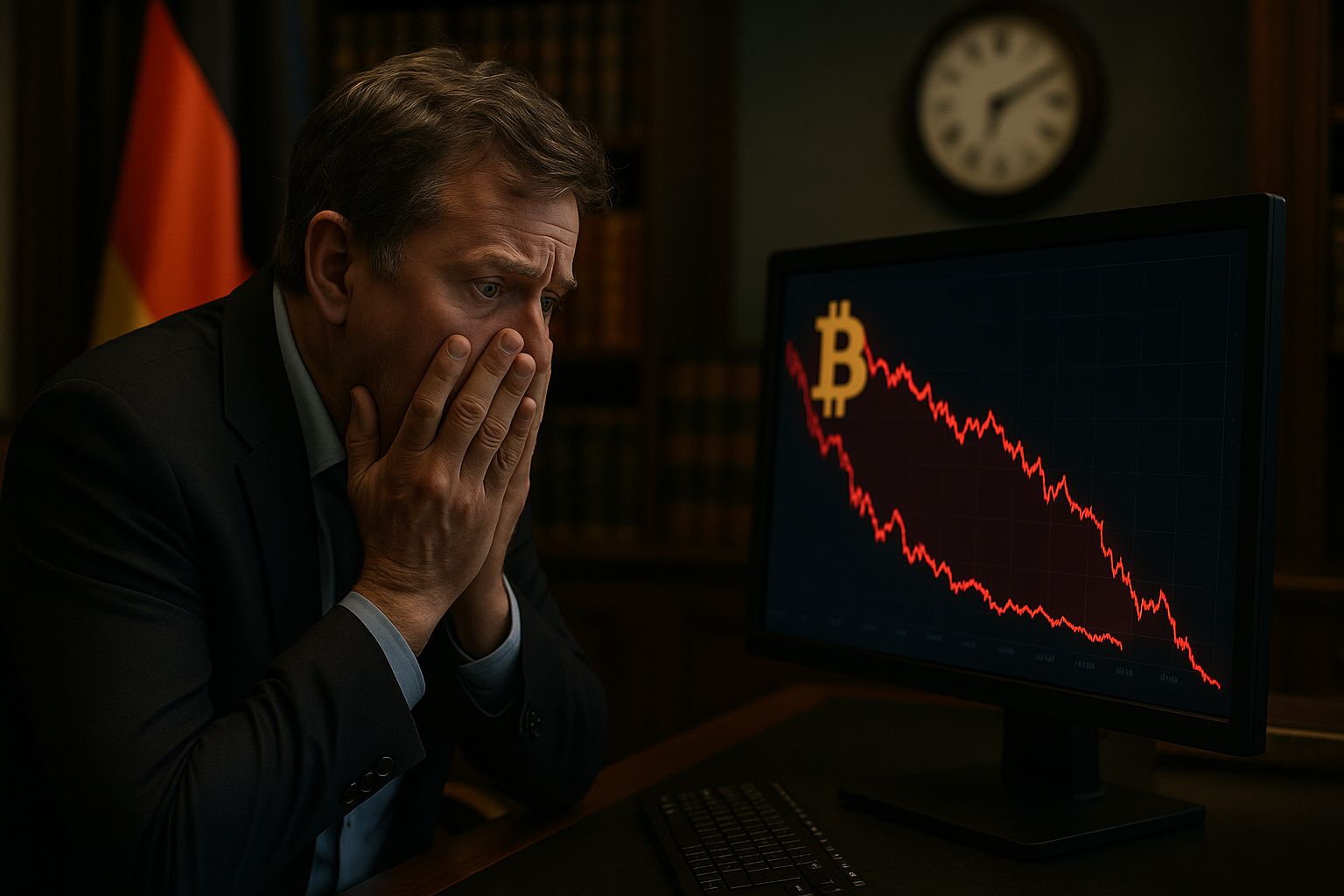- CROX ROAD
- Posts
- Why Germany May Have Missed a $5B Bitcoin Jackpot
Why Germany May Have Missed a $5B Bitcoin Jackpot
Germany seized nearly 50,000 Bitcoin from the Movie2K piracy case, but reports suggest another $5B stash was left untouched. Discover why Germany may have missed this Bitcoin jackpot, the challenges of crypto seizures, and what lessons governments and investors can learn.
In 2024, Germany made headlines by seizing nearly 50,000 Bitcoin from the operators of the Movie2K piracy website. At the time, the stash was valued in the billions and represented one of the largest state seizures of digital assets. But according to new blockchain analysis, Germany may have overlooked another massive trove—potentially worth $5 billion today—raising tough questions about how governments handle cryptocurrency seizures.
The revelation has sparked heated debate among policymakers, crypto experts, and the public about whether governments truly understand the nature of Bitcoin and other digital assets. Seizing and selling such assets is not as straightforward as liquidating physical property or fiat currency. Instead, it requires technical expertise, legal authority, and sometimes even luck in obtaining access to private keys.
This situation underscores a broader issue: as digital assets become increasingly intertwined with crime, commerce, and global finance, governments are still playing catch-up. The case of Germany and the Movie2K Bitcoin stash may go down as one of the most striking examples of both progress and missed opportunity in this evolving field.
Table of Contents

The Movie2K Case: A Brief Background
Movie2K was a notorious streaming piracy platform that operated in the early 2010s. Authorities linked its operators to illegal profits, much of which were funneled into Bitcoin. In January 2024, German prosecutors confirmed they had seized 49,858 BTC from suspects in the case.
The seizure was hailed as a major victory for law enforcement, marking a rare instance where illicit crypto wealth was successfully traced and brought under government control. Many other cases end without a clear trail because crypto transactions can be obfuscated through mixers, privacy tools, or multi-wallet laundering. This made the Movie2K seizure a showcase of forensic blockchain analysis in action.
However, what initially seemed like a decisive triumph may now look incomplete. The revelation of an additional $5B in linked Bitcoin calls into question how thorough the investigation really was, and whether officials underestimated the complexity of tracking and seizing all the assets connected to the case.
The $5 Billion Oversight
Crypto intelligence platform Arkham reported that approximately 45,000 Bitcoin linked to Movie2K remain in dormant wallets, untouched since 2019. At current prices, this stash is worth nearly $5 billion.
Dormant wallets are particularly suspicious in the crypto world, as they often belong to early adopters, criminals, or individuals who no longer have access to their funds. The fact that this stash has remained untouched for six years raises serious questions. Are the operators hiding, waiting for the right moment, or simply locked out of their own fortune?
For Germany, the existence of these untouched coins represents more than just lost money. It points to the possibility that even when governments appear to act decisively, the true scale of hidden digital wealth may remain out of reach. This oversight has implications for global efforts to combat financial crime in the digital era.
Why Didn’t Germany Seize the Remaining Bitcoin?
There are several possible explanations:
Private Key Barriers – Authorities may know the addresses but lack the keys, which are required to move the funds. Without the keys, ownership is impossible to prove in practice.
Legal Hurdles – Even if linked, courts often demand strict proof of ownership before allowing seizure. A blockchain trail alone may not satisfy legal standards.
Jurisdictional Issues – Some wallets may have connections to individuals or servers outside German legal reach, complicating any enforcement attempt.
Strategic Decision – Governments sometimes liquidate seized assets quickly to reduce volatility risk rather than hold long term.
Each of these reasons underscores the unique challenges of managing crypto assets. Unlike cash in a bank account, Bitcoin exists outside traditional systems of control. To seize it, you must not only identify where it sits on the blockchain but also gain physical or digital control of the private keys. Without those, the coins remain untouchable—no matter how clearly their origins can be traced.
This shows why governments are often criticized for lacking the tools to deal with digital assets effectively. Until stronger international frameworks and technical expertise are in place, many illicit wallets may remain permanently out of state control, creating a shadow economy that law enforcement can observe but not penetrate.

The Cost of Selling Early
Another major criticism is Germany’s timing of the sale. The 49,858 BTC sold in 2024 would be worth far more today, as Bitcoin’s price has climbed significantly since mid-2024.
Sold Value (2024): ~$2.8B
Current Value (2025): Over $5.5B
This difference illustrates the brutal volatility—and opportunity—of Bitcoin markets. Governments, by policy or law, often liquidate seized assets immediately to avoid accusations of speculation. But in this case, that approach meant leaving billions on the table. Had Germany simply held the coins, taxpayers would now be celebrating one of the biggest government “investments” in modern history.
Of course, hindsight is always 20/20. At the time of the sale, Bitcoin could just as easily have plunged in value, leaving critics to accuse the government of recklessness for holding. Still, the optics of selling low only to watch prices soar higher have fueled public debate about whether governments should rethink their strategies around crypto seizures.
Lessons for Governments and Investors
The German case shines a light on broader questions around crypto policy:
Should governments HODL? Many Bitcoin investors argue holding would have yielded better returns, though it carries political and financial risks.
How should seizures be managed? Quick liquidation ensures certainty, but might look reckless in hindsight. The line between responsibility and missed opportunity is thin.
What about missed coins? Identifying and securing all criminal crypto assets remains a complex, unfinished challenge.
For investors, the lesson is even clearer: timing matters. The volatility of Bitcoin means that both governments and private holders face tough decisions about when to sell. Germany’s case serves as a reminder that while Bitcoin can generate massive wealth, it can also expose decision-makers to equally massive second-guessing.
This is also a warning that the state is not immune to mistakes. Even with the resources of a government, crypto assets remain slippery, elusive, and unpredictable. That should give ordinary investors both comfort—because they are not alone in their struggles—and caution, because if governments struggle, the risks for individuals are even greater.

Conclusion
Germany’s handling of the Movie2K Bitcoin case shows both the power and the pitfalls of dealing with crypto assets. While it successfully seized and sold billions worth of Bitcoin, the possible oversight of an additional $5 billion raises questions about enforcement capacity, legal frameworks, and asset management strategies.
This case is a striking illustration of how digital assets challenge traditional institutions. Governments that fail to fully grasp the mechanics of cryptocurrency may lose billions in potential revenue, while criminals and early adopters remain steps ahead. As Bitcoin becomes more mainstream, these gaps in enforcement will only grow more visible.
In the end, the German Bitcoin saga is a cautionary tale. It shows that digital assets are not just speculative tools for traders—they are now an integral part of global finance and law enforcement. The question that remains is whether governments will adapt quickly enough, or whether the next $5 billion jackpot will slip away too.
FAQs
What was the Movie2K case?
Movie2K was a popular streaming piracy platform active in the early 2010s. German authorities linked its operators to illegal profits funneled into Bitcoin, leading to one of the largest crypto seizures in the country’s history.
How much Bitcoin did Germany seize?
In January 2024, Germany seized approximately 49,858 BTC from suspects involved in Movie2K. These coins were sold in mid-2024, generating around $2.8 billion at the time.
Why is there talk of a $5B oversight?
Crypto intelligence reports suggest another 45,000 BTC, linked to Movie2K, remain untouched in dormant wallets. At today’s prices, this stash is worth nearly $5 billion, raising questions about why it wasn’t seized.
Why didn’t Germany hold onto the Bitcoin longer?
By law, governments often liquidate seized assets quickly to avoid risk. While selling secured immediate revenue, it also meant missing out on Bitcoin’s later price surge, which would have nearly doubled the value of the coins.
What lessons does this case teach?
The Movie2K Bitcoin case highlights the difficulties governments face in seizing and managing digital assets. It also illustrates the risks of selling too early, showing both governments and private investors how critical timing is in crypto markets.
That's all for today, see ya tomorrow! If you want more, be sure to follow our X (@croxroadnewsco), Instagram (@croxroadnews.co), Youtube (@libertarianbtc), Tiktok (@croxroadnews) and nostr - [email protected]
VISIT OUR STORE

The Best Merch For Bitcoin Maxis
Visit Crox Road Store 👉🏻 https://croxroad.store/
FOLLOW US ON NOSTR

DISCLAIMER: None of this is financial advice. This newsletter is strictly educational and is not investment advice or a solicitation to buy or sell any assets or to make any financial decisions. Please be careful and do your own research.
You May Also Like
External Links
‘Strong chance’ US will form Strategic Bitcoin Reserve this year: Alex Thorn
Bitcoin.com Launches Fundraiser to Support Charlie Kirk’s Family With Bitcoin and Crypto Donations
BTC/USD: Bitcoin Prices Top $116,000 as Traders Ramp Up Risk Bets Ahead of Big Fed Event
Spot Bitcoin ETFs See $642M Inflows, Ether ETFs Add $405M Amid Rising Institutional Confidence
Bitcoin Climbs as Economy Cracks — Is it Bullish or Bearish?
Links From Our Sponsors
If You Like Our Content And Want To Help Us To Make It Better, You Can Buy Us One (Or More!) Coffee CLICKING HERE
Reply